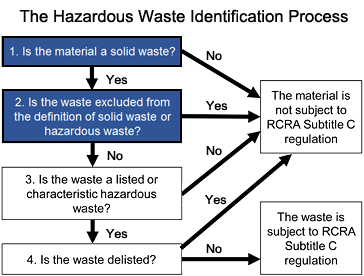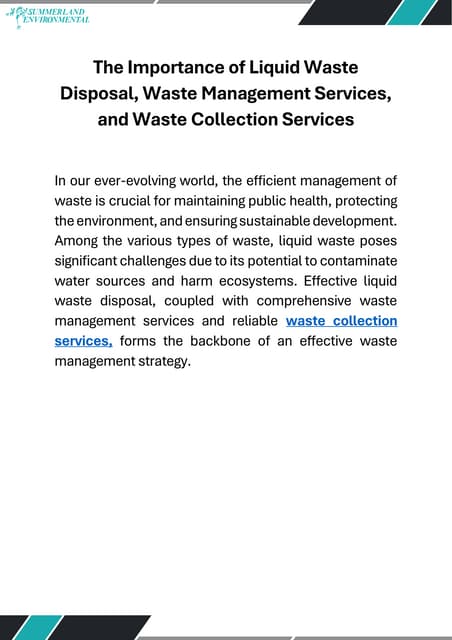What Does Reclaim Waste Do?
What Does Reclaim Waste Do?
Blog Article
Fascination About Reclaim Waste
Table of ContentsSome Of Reclaim WasteThe Best Guide To Reclaim WasteA Biased View of Reclaim WasteThe Best Guide To Reclaim WasteWhat Does Reclaim Waste Do?
Check out the kinds, occurrences, and types of liquid waste. Domestic sewage waste refers to the waste and products from a residential sewage-disposal tank. This kind of waste is developed by humans in houses, institutions, and various other structures. This only consists of septic systems that have a drain area. The appropriate management and disposal of residential sewage waste require fluid waste to be transferred to a sewer therapy plant where the appropriate approaches and tools are put on cleanse and deal with waste.
Business waste usually includes prospective dangers, such as flammable materials or a mixture of liquid and solid waste items, and needs an advanced and comprehensive disposal process. The disposal of business waste commonly involves the purification of waste prior to transport to make sure secure and correct disposal. Industrial waste is created from by-products and runoff of commercial procedures and manufacturing.
This kind of waste can not utilize the very same sewage monitoring transportation or processes as septic or business liquids. The industrial waste administration procedure requires the inspection and screening of fluid waste before it undergoes the disposal process (liquid waste disposal). Overflow waste is the fluid waste that comes from runoff and excess stormwater in very populated locations or cities
Runoff waste can trigger contamination and flooding if not managed correctly. Ensuring correct waste administration can prevent catastrophes and lower environmental harm.
Get This Report on Reclaim Waste
Contact PROS Services today to discover our waste management and disposal solutions and the correct methods to take care of the fluid waste you produce.
(https://fliphtml5.com/homepage/kekhp)This supposed 'wastewater' is not only an essential source but, after treatment, will certainly be launched to our land, waterways or the sea. Made use of water from bathrooms, showers, bathrooms, kitchen sinks, laundries and industrial processes is known as wastewater.

water utilized to cool machinery or tidy plant and devices). Stormwater, a form of wastewater, is runoff that flows from farming and metropolitan locations such as roofing systems, parks, gardens, roads, courses and gutters into stormwater drains pipes, after rainfall. Stormwater flows untreated directly to neighborhood creeks or rivers, ultimately reaching the sea.
What Does Reclaim Waste Mean?
In Queensland, a lot of wastewater is treated at sewage therapy plants. Wastewater is moved from domestic or commercial sites with a system of sewers and pump stations, called sewerage reticulation, to a sewage therapy plant. City governments construct, keep and run most sewer therapy plants. Operators are certified under the Environmental Security Act 1994 to release cured wastewater at an acceptable ecological standard right into waterways.
The Department of Natural Resources recommends city governments regarding handling, operating and keeping sewage systems and treatment plants. In unsewered locations, neighborhood governments may need homeowners to install private or family sewage therapy systems to treat domestic wastewater from bathrooms, kitchen areas, restrooms and laundries. The Department of Natural Resources authorizes making use of house systems when they are proven to be effective.
In some brand-new subdivisions, treatment of some stormwater to remove clutter, sand and gravel has actually started making use of gross toxin catches. Wastewater therapy takes place in four phases: Removes strong matter.
Makes use of tiny living organisms knows as micro-organisms to break down and get rid of staying liquified wastes and fine bits. Micro-organisms and wastes are incorporated in the sludge.
Some Known Facts About Reclaim Waste.
Nutrient removal is not offered whatsoever sewer therapy plants because it needs expensive specialized tools. It is becoming a lot more usual in Queensland. Clear fluid effluent produced after therapy may still include disease-causing micro-organisms. If this effluent is launched into waterways such as rivers or the sea, the micro-organisms will ultimately die out.

This normally indicates wastewater needs to be treated or impurities removed prior to it can be discharged to rivers. A lot of wastewater moves right into the sewerage system. Under the Act, city governments provide authorizations and permits for environmentally relevant activities (Periods) including wastewater releases that could have a neighborhood influence. The division administers approvals and licences to ERAs involving wastewater releases that could have a local or statewide effect.
The Single Strategy To Use For Reclaim Waste
Otherwise, samples are taken for laboratory evaluation. Usually many examinations are required to establish the degrees of each of the different contaminants such as oils, heavy metals and chemicals in water. Monitoring offers valid details about water quality and can validate that licence conditions are being met. The info obtained with monitoring supplies the basis for making water top quality decisions.
Report this page